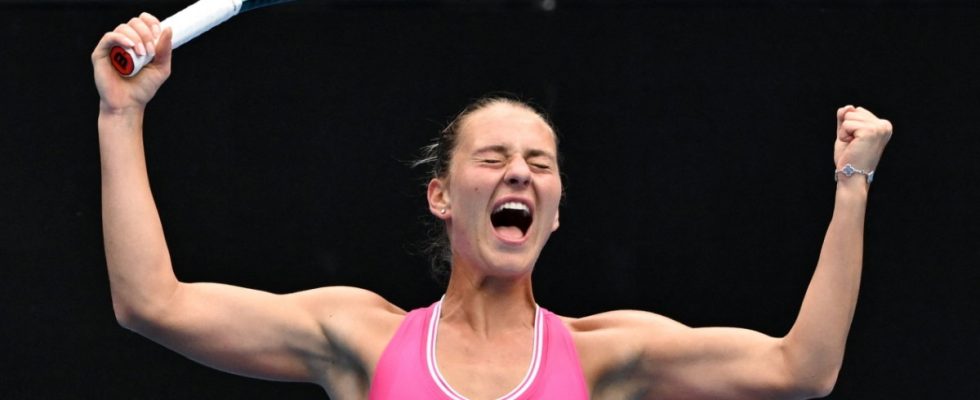At first glance, this was a normal tennis match on a cool Sunday afternoon in Melbourne: two young women dueled for an hour and a half until the older one won relatively easily 6-2, 6-1. Only when Marta Kostjuk, 21, from Kiev walked straight to her bench after the match point, put a towel around her shoulders and cautiously clenched her hand into a fist, while her opponent Maria Timofejeva, 20, from Moscow quickly left the court with her bag on her shoulder , some visitors may have noticed that one detail was missing: the obligatory handshake at the net.
Just a few months ago, in the summer in Paris and Wimbledon, this demonstrative refusal of ritual had led to heated debates, sometimes to whistles from the uncomprehending audience in the stands. In the meantime, label violations are hardly registered anymore. Ukrainian players do not shake hands with their rivals from Russia and war-aligned Belarus; the sports scene has gotten used to it. And even outside the tennis realms limited by narrow white lines, Marta Kostjuk complained quietly, the world has now “largely suppressed” Russia’s war of aggression against Ukraine.
Kostyuk has repeatedly used her appearances in Australia at the beginning of the third year of the war as an opportunity to remind people that the suffering continues in her country: “People die every day,” she said. It doesn’t go unnoticed that the public is turning its attention to other problems; Fundraising events and benefit tournaments for Ukraine, like last year, were not held in Melbourne this time. She therefore sees herself as a kind of ambassador for her country, fighting against oblivion on the tennis court with a racket in her hand. Her mother, she said, sends her videos when the rockets fly over the house. “I’m here to keep reminding people that the war is still going on and needs to be stopped,” she said: “It’s a completely unequal and terrible war.”
Iga Swiatek surprisingly fails due to the Czech Linda Noskova
In Melbourne she is not alone on this mission. Three Ukrainians have worked their way into the second week of the tournament: In addition to Kostjuk, Elina Svitolina, 29, and Dajana Jastremska, 23, both born in Odessa, also reached the round of 16. This is not just a Ukrainian record at the Australian Open – but a first at all four Grand Slam tournaments since the country’s independence. “I think this shows how strong the people of Ukraine are,” Kostyuk said on Sunday with a small smile.
By defeating the Russian Timofeeva, she was the first to secure a place in the quarter-finals and hopes that her colleagues will follow her: the more compatriots on the blue courts, the better – so that the news of the reality of war penetrates this tennis festival on the Yarra River made of flying balls, barbecue atmosphere and beer.
Elina Switolina could also reach the quarter-finals in Melbourne.
(Photo: Tracey Nearmy/Reuters)
The conditions for this are actually favorable. At the beginning of the second week of the tournament, the women’s competition at the Australian Open focuses far less than usual on the usual headlines and names. The famous tennis mothers – Angelique Kerber, Naomi Osaka and Caroline Wozniacki, who made their comeback as former world number one – have left after early defeats. Wimbledon champion Marketa Vondrousova also said goodbye quickly, like her predecessor Jelena Rybakina.
On Saturday came the surprising end for Iga Swiatek from Poland, the outstanding player in recent months: The world number one, who triumphed at the WTA annual final in November and was unbeaten in 18 matches, lost to an almost unknown 19-year-old , the Czech Linda Noskova, 6:3, 3:6, 4:6 in round three. Swiatek left Melbourne feeling pensive: until the end she believed she had the match – and her opponent – under control.
Lessia Zurenko reports sometimes negative reactions when she draws attention to the situation in Ukraine
After eight days, we now have a relatively strange look at the table: Of the top eight players in the world rankings, only two, Coco Gauff, the US Open winner, and defending champion Aryna Sabalenka from Belarus, are already in the quarterfinals. Nine unseeded players took their chance to at least establish themselves in the round of 16: the organizers said this last happened at the Australian Open in 1980. On Europe’s clay courts, however, the field of participants often shuffles around. There were nine unseeds on the red ashes of Roland Garros as recently as 2023.
Marta Kostjuk, as number 35 in the world, was also not one of the favorites. But when she was asked why she and her Ukrainian colleagues were capable of such achievements on the tennis court despite the traumatic war experiences and the immense political and private problems, she found an answer after a moment’s thought: “I think that shows that There is no limit to human possibilities to withstand stress and everything that comes with it.”
Her colleague Lessia Zurenko, who lost to world number two Sabalenka in the second round in Melbourne, reported sometimes negative, almost hostile reactions when she drew attention to the situation in her country on social channels. Many people are tired of the reports, “they don’t want to hear anything about the war or bad news,” she suspects. On Saturday, she reported on Instagram about a friend who had returned home after a year and a half as a prisoner of war: “He has lost 55 kilos and has an infection in his leg, but the most important thing is that he is alive,” she wrote.
Before she left Melbourne, she said: A tennis match was no longer the most important thing in her life. “For me now it’s more about being able to be here and reporting on the war. And I can earn money that I can then donate.”

